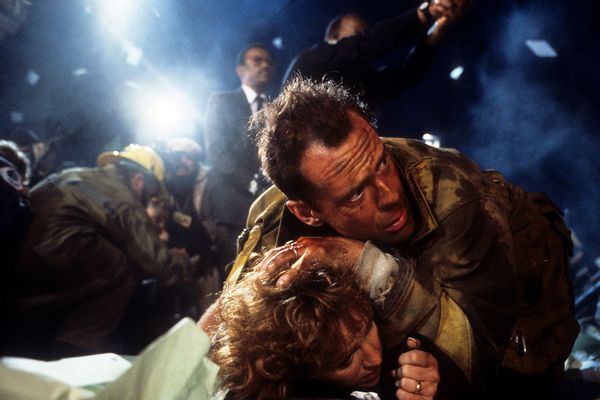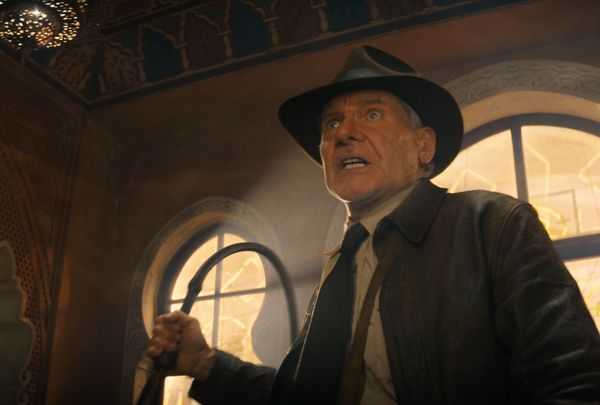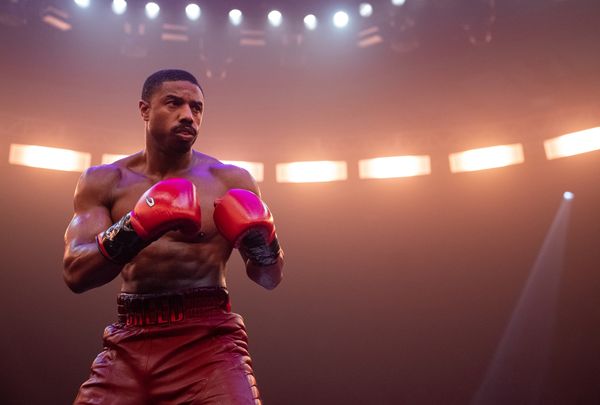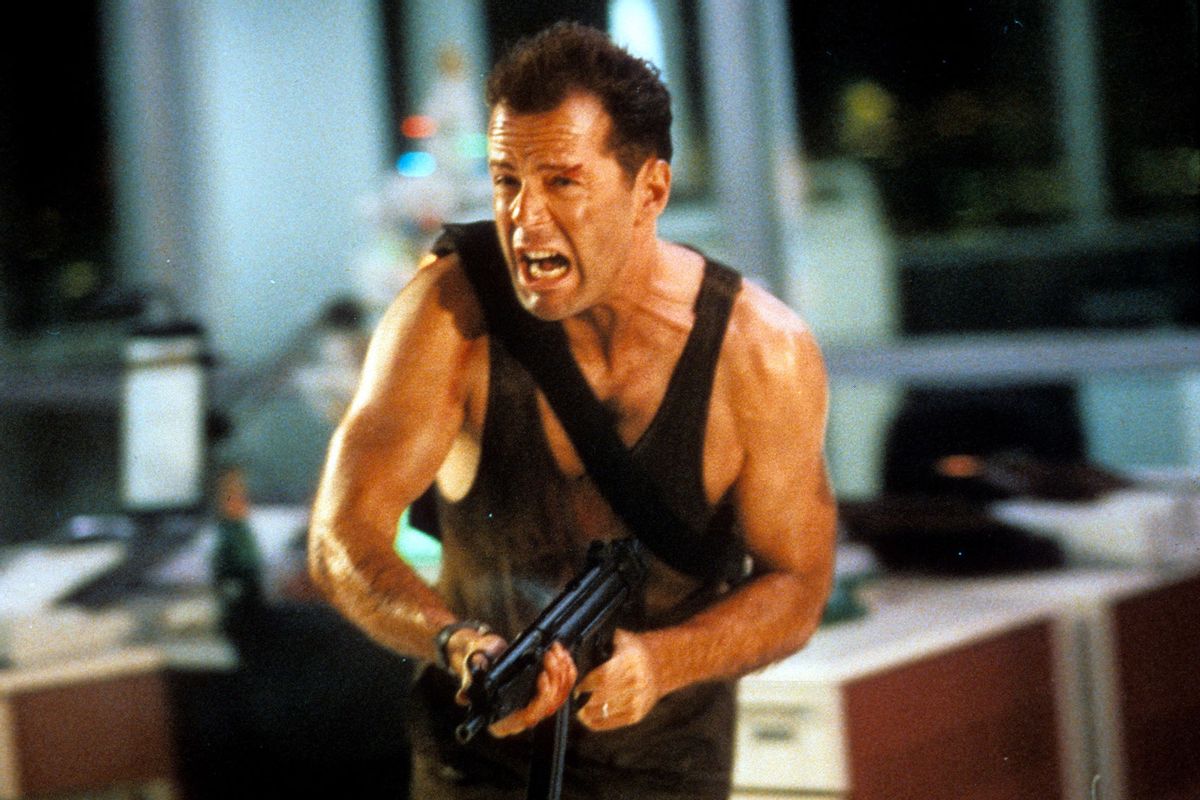Thirty-five years after "Die Hard" hit theaters, the Bruce Willis vehicle maintains its rep as a chef-d'oeuvre due to its perennial relevance. The creaky debate concerning whether it's a holiday movie guarantees it'll resurface at Christmastime; in fact, the miracle at Nakatomi Plaza probably turns up on more people's midwinter viewing lists than whatever happened on 34th Street.
If that's true, one should also credit the John McTiernan-directed classic's considerable influence on 1990s action cinema. For a little while every other action movie boiled down to "Die Hard In/On a (Fill in the Blank)." That decade was a bonanza for "Die Hard on a Plane" movies, a list that includes 1992's "Passenger 57," 1996's "Executive Decision," and the 1997 double serving of "Con Air" with Nicolas Cage and "Air Force One" starring Harrison Ford.
That trend hasn't entirely faded, either. Few degrees of thematic separation stand between Willis' "Die Hard" John McClane and John Wick, for instance. Each is a forlorn husband aching over the loss or impending loss of his wife; each presented a convenient outlet for his rage when organized criminals mess with him at an emotional nadir. (Also, would "John Wick" star Keanu Reeves be where he is today without 1994's "Speed," aka "Die Hard on a Bus"?)
None of the flicks "Die Hard" begat could replicate the essential ingredients that wowed the original's audiences in the first place, which was the ordinariness of its heroes and main villain Hans Gruber, played by Alan Rickman.
Even 35 years ago, audiences were tired of watching slightly different versions of the same old story.
Willis was a TV star at the time, the scruffy heartthrob flirting with Cybill Shepherd's elegant uptown girl in the detective dramedy "Moonlighting." Rickman's career was mainly in the theater. Reginald VelJohnson, who plays McClane's LAPD buddy on the ground Al Powell, was living with his mother. For all those reasons and others, "Die Hard" was considered a gamble by 20th Century Fox. The studio only added Willis' mug to the movie's posters after it broke out as that summer's biggest blockbuster.
Now, consider what might have happened if the studio hadn't taken a chance on these stars and this script, an extensively mutated adaptation of Roderick Thorp's 1979 detective novel "Nothing Lasts Forever." Actually, you don't have to tax your brain too much with that assignment, since it's playing out in the form of endless TV show reboots, film remakes and franchise extensions beyond healthy lifespans.
Large studios would much rather freshen up old formats for a new generation or spend exorbitant amounts wringing out established IP than seeking out fresh ideas. That makes it highly unlikely that "Die Hard," if it were pitched fresh in 2023, would see daylight, let alone a summer.
Think about what that would mean. None of Willis' other movies, maybe not even "Pulp Fiction." Instead, more Sylvester Stallone, more Arnold Schwarzenegger, more of those 'roided-out toy soldiers that made '80s action movies . . . well, they were fun too. But they were also brainless.
 Bonnie Bedelia is held down by Bruce Willis in a scene from the film 'Die Hard', 1988. (Photo by 20th Century-Fox/Getty Images)Many "Die Hard" fans with greater expertise than I have written about it, but in my admittedly biased opinion no appreciation is as thorough and affectionate as my friend and colleague Matt Zoller Seitz's deep gaze into its legacy 10 years ago for RogerEbert.com.
Bonnie Bedelia is held down by Bruce Willis in a scene from the film 'Die Hard', 1988. (Photo by 20th Century-Fox/Getty Images)Many "Die Hard" fans with greater expertise than I have written about it, but in my admittedly biased opinion no appreciation is as thorough and affectionate as my friend and colleague Matt Zoller Seitz's deep gaze into its legacy 10 years ago for RogerEbert.com.
Within that analysis, he calls out a reason the movie struck a chord with audiences that's similar to what has gone missing in today's CGI-polished action movies, which is down-to-Earth humanity.
"Viewers were so used to the Stallone/Schwarzenegger/Chuck Norris-type superman characters that the sight of a hero muttering to himself and even tearing up was startling," Seitz observed. "This was no action figure. This was a man—a brave and physically capable man, one whose derring-do sometimes defied physics or seemed to, but a man nonetheless. It was easy to picture John McClane tending a grill in somebody's backyard, arguing about the Yankees and cracking open another brew. "
More than three decades ago Willis' McClane shifted our action expectations away from larger-than-life hulks. Today, the ones most likely to be placed before us probably work with the Hulk. Marvel is the mascot for the franchise overkill, although so far one of the season's most financially successful movies is "Guardians of the Galaxy Vol. 3."
Its Marvel sibling "Ant-Man and the Wasp: Quantumania" failed to return a profit after its late winter release. The earnings performances of their DCU competition "Shazam! Fury of the Gods" and "The Flash" were even more abysmal.
Moviegoers' malaise isn't limited to the superhero genre, either. Worldwide audiences didn't drive to "Fast X" with the same vigor as its nine – nine! – predecessors. Ditto for "Transformers: Rise of the Beasts." We shouldn't be surprised that "Indiana Jones and the Dial of Destiny," the final entry in the 42-year-spanning saga of Ford's defining swashbuckler, is struggling to break even and bombing out in China, the American film industry's most lucrative overseas market.
 Harrison Ford in "Indiana Jones and the Dial of Destiny" (Lucasfilm)The seventh film in Tom Cruise's "Mission: Impossible" franchise, "Dead Reckoning Part One" enjoyed a record-setting $235 million global take in its opening weekend, but its domestic opening was still softer than expected. You don't have to squint to notice what the two titles have in common – two aging stars and stories that have recurred over several decades, changing little aside from the special effects even as the ways people watch their movies have evolved substantially.
Harrison Ford in "Indiana Jones and the Dial of Destiny" (Lucasfilm)The seventh film in Tom Cruise's "Mission: Impossible" franchise, "Dead Reckoning Part One" enjoyed a record-setting $235 million global take in its opening weekend, but its domestic opening was still softer than expected. You don't have to squint to notice what the two titles have in common – two aging stars and stories that have recurred over several decades, changing little aside from the special effects even as the ways people watch their movies have evolved substantially.
As Hollywood enters what is classically its most lucrative season contending with a dual-strike by the Writers Guild of America and SAG-AFTRA, which represents film and TV stars, much of the industry's grumbling from executive suites points out the terrible timing of the combined labor action. (Salon's unionized employees are represented by the WGA East.)
The lesson here seems pretty obvious: less Indy, more indie.
The overall box office-driven marketplace was struggling before the strikes were called, with the New York Times citing that domestic ticket sales were down 20% from the last pre-pandemic summer blockbuster season in 2019. Back then box office sales were already off by 5% from the previous year, the National Association of Theater Owners reported at the time.
Many of the underlying reasons writers and actors are revolting are related to the same tyrannical obsession with established IP despite visibly diminishing returns. The streaming model's woefully inadequate and lopsided compensation model plays a huge role in that. But another issue is the whopping budgets apportioned to those previously named financial flops or bombs in the making.
Much as I love Indiana Jones, its reported $300 million price tag requires it to make at least double that in ticket sales to earn what it cost. "Die Hard" cost $28 million to make in 1988. In today's dollars, that's around $72 million. Doing the math, what Disney and Lucasfilm are purported to have spent on "The Dial of Destiny" could have made four equivalent "Die Hard" swings, with enough cash left over for a scrappy, whip-smart independent film. The lesson here seems pretty obvious: less Indy, more indie.
Meanwhile, "Rambo III" came out a month and a half before "Die Hard" in '88, and had a budget of $63 million, making it one of the most expensive movies of its time. It only cleared $53,715,611, according to Box Office Mojo. Even 35 years ago, audiences were tired of watching slightly different versions of the same old story.
All that said, if Willis' aphasia diagnosis hadn't forced him to retire from acting last year, we might be logging the same complaints about "Die Hard," whose four sequels never matched the intensity or ingenuity of the original. It spawned video games, comic books and references aplenty. McClane has a daughter and a son; I guarantee you there are treatments for TV spinoffs or narrative expansions floating around.
Want a daily wrap-up of all the news and commentary Salon has to offer? Subscribe to our morning newsletter, Crash Course.
So yes, "Die Hard" is, in its way, part of the problem. Barring the announcement of a new project, however, a better way to honor its legacy may be to view it as the strongest argument for a reset. Look at what placing a wild bet on X factors gave generations of movie and TV viewers.
VelJohnson, the TV Dad in those insurance company commercials, made such an impression as the vulnerable Al that shortly after "Die Hard" he made his network TV debut as Carl Winslow on "Family Matters," the anchor of ABC's era-defining "TGIF" programming block. Rickman became a comedy movie star and is beloved by Xers and Millennials as Severus Snape from the "Harry Potter" movies. (On a related note, Warner Bros. Discovery announced that it is remaking "Harry Potter" for Max as a TV series. Sigh.)
There is a way to plug into our affection for past classics while seeding the next generation of actors and filmmakers, mind you. "Creed III," a second sequel to Michael B. Jordan's "Rocky" series spinoff and his directorial debut, had a "Die Hard"-like estimated production budget of around $75 million and has grossed more than $275 million in global ticket sales.
 Michael B. Jordan stars as Adonis Creed in "CREED III" (Eli Ade/MGM)John McClane was funny and frightened. He walked on glass barefoot but showed us how much that hurt; he leaped from a tall building in a single bound, but not without the assistance of a fire hose tied around his waist while pleading to God, "Please don't let me die." His willingness to grimace at his mortality and still face death with a laugh and "yippee-ki-yay, motherf****r" made Willis a marquee star, redefining gunslinging protagonists for a generation.
Michael B. Jordan stars as Adonis Creed in "CREED III" (Eli Ade/MGM)John McClane was funny and frightened. He walked on glass barefoot but showed us how much that hurt; he leaped from a tall building in a single bound, but not without the assistance of a fire hose tied around his waist while pleading to God, "Please don't let me die." His willingness to grimace at his mortality and still face death with a laugh and "yippee-ki-yay, motherf****r" made Willis a marquee star, redefining gunslinging protagonists for a generation.
We may never see another like him. And until major studios break their addiction to comic book adaptations, all things Lucasfilm, and slightly refreshed stories about old musclemen, it may be a while before we meet his next version – someone we haven't seen before.
Read more
about this topic



Shares